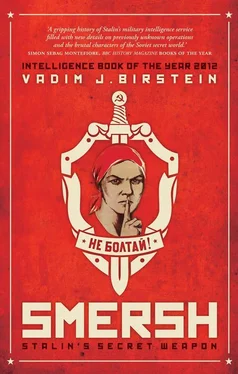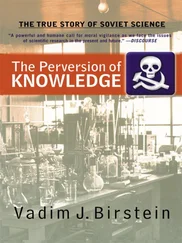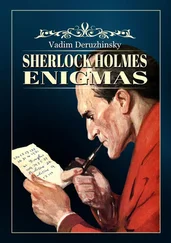SMERSH spied on its own servicemen, investigated and arrested even senior officers on Stalin’s orders and tirelessly vetted Soviet POWs. From June 1941 to May 1945, forty-seven Red Army generals arrested by military counterintelligence during the war were executed, or died in labor camps or in special investigation prisons while awaiting trial. 3Later, after Stalin’s death in March 1953, these generals were politically rehabilitated—in other words, it was officially admitted that they were innocent; the number of real collaborators with the Nazis among the high Soviet military, like General Andrei Vlasov, was very small. Overall, from 1941 to 1945, military tribunals sentenced 472,000 servicemen whose cases were investigated by military counterintelligence and of them, 217,000 were shot. About 5.4 million Soviet POWs and civilians sent by the Nazis to Germany as slave laborers went through SMERSH’s hands, and 600,000 of them ended up as convicts in the GULAG. 4In Eastern Europe, SMERSH cleansed newly-acquired land of any potential threat to Sovietization. Former Russian émigrés in these countries were specially targeted by SMERSH.
SMERSH successfully fought against and outwitted many operations of the German secret services, the Abwehr and SD (the foreign branch of the German State Security). These results were not only because of the overwhelming number of SMESRH officers compared to the German intelligence services, but were also due to the sophistication of SMERSH’s organization. During its three years of existence, SMERSH operatives captured or killed 9,500 German agents and saboteurs and successfully carried out more than 180 deception operations. In August–September 1945, during a short military campaign against Japan, thirty-five SMERSH operational groups dropped from planes to arrest approximately 800 intelligence and military Japanese leaders and at least 400 former White Russian and Russian fascist collaborators with the Japanese. Later, during vetting of the Japanese POWs, SMERSH operatives arrested up to 50,000 alleged Japanese agents. According to General Aleksandr Bezverkhny, head of the current Russian military counterintelligence, ten million POWs, Soviet and foreign, were vetted by SMERSH. 5
SMERSH was created on Stalin’s secret orders. This is not surprising, since SMERSH existed during a time when Stalin was juggling many competing security agencies, constantly changing their structure, responsibilities, and leaders. In addition, Stalin took steps to ensure that SMERSH personnel would be difficult to identify, even by the Red Army personnel they worked among. For instance, SMERSH officers wore standard Red Army uniforms and had standard Red Army ranks, since they were formally part of the Defense Commissariat, but they did not report to the military hierarchy—only to higher-level SMERSH officers. SMERSH officers could be identified only by their special IDs.
Due to the complete secrecy that surrounded SMERSH during and just after the war, its activities are almost unknown in the West. If the name ‘SMERSH’ is familiar to English readers, it is probably because of its use in the spy novels of Ian Fleming. A Royal Navy intelligence man during World War II, Fleming must have run across the name during his work and decided to use SMERSH as the name of his fictional Soviet spy agency, perhaps because the acronym sounds vaguely absurd in English. In the second chapter of his debut novel, Casino Royale , SMERSH is introduced in a fictional ‘Dossier to M,’ which is a curious combination of fact and fiction. 6Fleming states correctly that ‘SMERSH is a conjunction of two Russian words: “Smyert Shpionam”, meaning roughly: “Death to Spies”’, but he incorrectly identifies the head of SMERSH as Lavrentii Beria (in fact, NKVD Commissar) and locates its headquarters in Leningrad, while SMERSH headquarters, like all important Soviet agencies, was actually in Moscow. In his second novel, From Russia with Love , Fleming places SMERSH’s HQ in Moscow on the Sretenka Street, not far from its real location on Lubyanka (Dzerzhinsky) Square, but writes that SMERSH was ‘the murder apparat of the MGB’, which is not accurate. 7
Even among Western historians and the many avid readers of World War II history, SMERSH is almost unknown. For instance, the impressive 982-page The Library of Congress World War Companion , published in 2007, does not mention SMERSH at all. 8Similarly, the British historian Chris Bellamy mentions SMERSH only twice in his encyclopedic 813-page study, Absolute War , even though this book about the Great Patriotic War analyses, among other topics, the role of the troops of the Soviet security services. 9Obviously, these omissions have occurred because of the secrecy and lack of archival information until the 2000s. Christopher Andrew and Oleg Gordievsky devote only three paragraphs to SMERSH in their comprehensive book on the history of Soviet security services, KGB: The Inside Story , which was published in 1990; this is not nearly enough coverage of such an important organization and its role during World War II. 10In The Lesser Terror, Michael Parrish gives an accurate short account of what was known in the early 1990s about SMERSH’s activities and its leader, Abakumov, but the few other English-language books that do mention SMERSH mostly give inaccurate information. 11
The most important works in English about SMERSH are two little-known memoirs by defectors: SMERSH by Nicola Sinevirsky (a pseudonym of Mikhail Mondich, a young man from Carpathian Ruthenia who worked for SMERSH as a translator), and Nights Are Longest There: A Memoir of the Soviet Security Services by A. I. Romanov (a pseudonym for the only known SMERSH defector, Captain Boris Baklanov). 12I have found the information in both of these memoirs to be quite accurate. The detailed descriptions of SMERSH interrogations, during which Sinevirsky acted as translator, are particularly revealing.
If you talk to Russian war veterans about the World War (which they call the Great Patriotic War), most of them still recall the fear of the osobisty, as military counter intelligence officers were generally known, and of smershevtsy (plural for officers of SMERSH; the singular is smershevets ). The word osobist (singular) comes from the name Osobyi otdel (Special Department or OO) of counterintelligence departments in the Red Army until April 1943. For instance, Vladimir Nikolaev, a Russian writer and veteran of World War II, recalled:
The so-called SMERSH (‘Death to Spies’) was the most horrible organization within the army and the fleet… Day and night, its countless fattened impudent officers watched every serviceman, from privates up to generals and marshals. Everyone was afraid of SMERSH… Its officers frequently invented criminal cases to demonstrate their necessity and usefulness, but mainly to avoid being sent to the front line. They lived very well and escaped the bullets and bombs. 13
Aleksandr Solzhenitsyn, who described his arrest by SMERSH operatives at the front in February 1945 in his famous book, The Gulag Archipelago , tells us that ‘the counterintelligence men used to love that tastelessly concocted word “SMERSH”… They felt that it intimidated people.’ 14
Until recently, many Russians knew of the activities of smershevtsy mainly through a popular novel, In August 1944 , by Vladimir Bogomolov, published in 1974. 15Bogomolov, a former military intelligence officer, based the novel on his own experience during the war. The KGB ( Komitet gosudarstvennoi bezopasnosti or State Security Committee) and Defense Ministry were amazed that Bogomolov had managed to recreate the events so accurately without using documents. They tried to prevent the publication of two chapters of the novel, but Bogomolov, who was not a member of the Communist Party or the Writers Union, refused to compromise with the authorities, and the novel was finally published without censorship. 16The novel describes SMERSH’s actions against Ukrainian nationalists and became an icon of the Great Patriotic War among many Soviet war veterans.
Читать дальше












